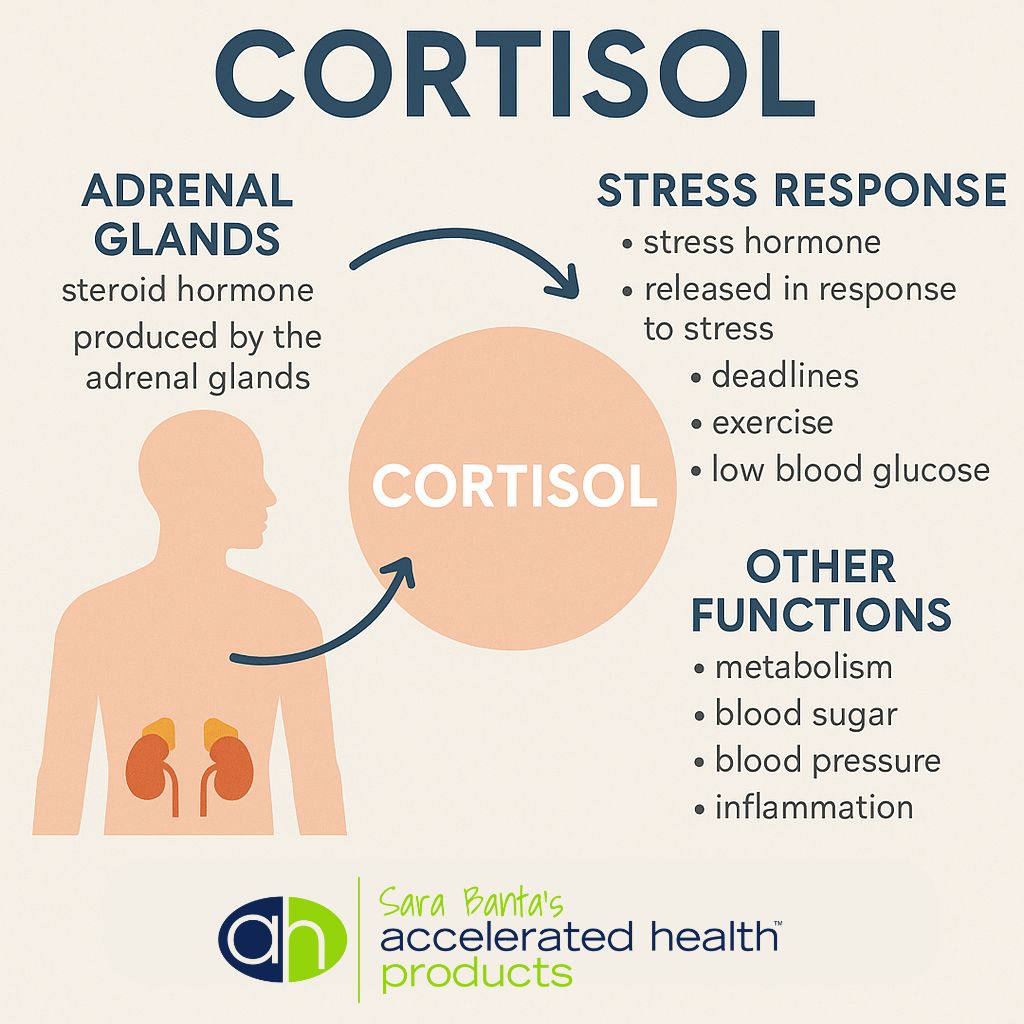A health trend known as the “cortisol cocktail” or “adrenal cocktail” is currently going viral across TikTok and other social platforms. Wellness influencers are blending orange juice, coconut water, sea salt, and magnesium powder into colorful drinks they claim will “heal your adrenals,” reduce cortisol, and improve energy levels.
The concept isn’t new, but the current wave of attention has reignited public interest in adrenal health, particularly among individuals experiencing chronic fatigue, hormonal imbalances, mood instability, and brain fog.
High stress can lead to increased cortisol production by the adrenal glands, which may contribute to symptoms like low energy, weight gain, and other health issues.
The Cortisol Cocktail Rationale
The rationale behind the drink is that stress depletes key minerals like sodium, potassium, magnesium, and vitamin C—nutrients that are involved in adrenal hormone production. Replenishing them, the theory goes, can help balance cortisol and support recovery. This idea is based on the vital roles cortisol plays in the body’s stress response and various physiological functions.
These drinks are often marketed to boost energy and provide an energy boost, but scientific evidence supporting these claims is lacking.
While there is some truth in the underlying idea—chronic stress does in fact drain critical nutrients—these sugary beverages are not the solution for restoring true adrenal function. In fact, they may be doing more harm than good by spiking blood sugar, aggravating insulin resistance, and stimulating more cortisol production in the long term.
There is no scientific evidence that cortisol cocktails lower cortisol or improve stress.
If you’re dealing with adrenal fatigue, you need more than a trendy drink. You need to understand the deeper physiology behind stress, mineral loss, mitochondrial burnout, and endocrine resilience. And most importantly, you need to address the two foundational nutrients that are often missing in the modern diet: salt and iodine. A healthy diet and effective stress management techniques, such as regular exercise, meditation, and adequate sleep, are essential for supporting adrenal health and regulating cortisol levels.
Introduction to Cortisol
Cortisol is a powerful steroid hormone produced by your adrenal glands, often called the “stress hormone” because of its central role in the body’s stress response system. Whenever you encounter a stressful situation—whether it’s a looming deadline, an intense workout, or even low blood glucose—your adrenal glands release cortisol to help your body adapt. But cortisol does much more than just respond to stress.

It’s essential for regulating metabolism, maintaining stable blood sugar and blood pressure, and supporting overall hormone balance and well-being. Cortisol affects nearly every organ and tissue in your body, helping to control inflammation, manage energy, and keep your body functioning smoothly. Its levels naturally rise in the morning to help you wake up and get moving, then gradually decrease throughout the day, following your body’s circadian rhythm. Understanding how cortisol works is key to managing stress and supporting your health from the inside out.
Understanding Cortisol Levels
Cortisol levels are not static—they fluctuate throughout the day and can be influenced by everything from your sleep patterns to your stress levels. When you’re under chronic stress, your body may produce too much cortisol, leading to a range of health problems such as weight gain, high blood pressure, and a weakened immune system. Over time, this can disrupt your body’s ability to regulate metabolism, growth processes, and even your sleep-wake cycle. On the other hand, if your adrenal glands are unable to produce enough cortisol—a condition known as adrenal insufficiency—you may experience symptoms like fatigue, poor sleep, and low energy.
Both high and low cortisol levels can throw your body out of balance, making it essential to support healthy cortisol production and maintain hormone balance for optimal well-being.
The Problem with Cortisol Cocktails
Despite their popularity, adrenal cocktails are often missing the mark. The most common formulations include fruit juice (often high in sugar), coconut water, a pinch of sea salt, and magnesium glycinate or bicarbonate. While this may provide a brief improvement in hydration and a small dose of minerals, it does not address the underlying mechanisms of adrenal burnout.
The sugar content—especially from orange juice or maple syrup—can cause rapid elevations in blood glucose, followed by sharp drops. This reactive hypoglycemia prompts the body to release cortisol and adrenaline as part of the body’s stress response, driving the very stress response the drink is meant to calm.

Cortisol affects various bodily functions, including regulating metabolism and blood sugar levels, so repeated spikes can disrupt these essential processes. By stimulating more cortisol production in the long term, this can result in extra cortisol circulating in the body, which is associated with symptoms like fatigue, increased appetite, and weight gain.
Moreover, the amount and form of minerals in these drinks are typically insufficient to restore intracellular electrolyte balance, support mitochondrial energy production, or reduce the adrenal burden of chronic stress.
To truly restore adrenal health, we need to go deeper into the biochemical pathways that regulate stress responses—and understand how the body manages mineral loss, hormonal signaling, and cellular energy during prolonged or repeated exposure to stress.
While cortisol cocktails may be generally safe for healthy individuals, those with underlying health conditions should consult a healthcare provider before use.
What the Adrenal Glands Actually Do
Perched atop your kidneys, your adrenal glands are chemical command centers for managing stress, energy, blood pressure, and recovery.
Cortisol: Known as the “stress hormone,” cortisol helps your body respond to stress, but it also plays a crucial role in regulating metabolism, managing inflammation, controlling blood sugar, and maintaining your circadian rhythm.
The Seven Major Stress Hormones:
- Cortisol – Manages inflammation, blood sugar, and circadian rhythm.
- Adrenaline (Epinephrine) – Increases heart rate and blood flow.
- Norepinephrine – Enhances focus, blood pressure, and alertness.
- Aldosterone – Regulates sodium and hydration.
- DHEA – Supports hormone synthesis and recovery.
- Pregnenolone – Precursor to cortisol and DHEA.
- Androgens – Influence muscle, libido, and mood.
Each of these requires sodium, iodine, and ATP—and when you’re under stress, they’re depleted fast.
How Stress Depletes Salt (Sodium)
Sodium is your adrenal battery pack. When stress rises, so does:
Aldosterone, to conserve sodium.
Cortisol, which indirectly leads to sodium wasting.
Epinephrine & norepinephrine, which ramp up sweat and urine output, flushing sodium even further.
Signs you’re running low:
Dizziness or lightheadedness
Salt cravings
Brain fog
Fatigue
Low blood pressure
Your adrenals can’t function without salt—but not just any salt will do.
The Central Role of Salt in Adrenal and Kidney Health
Salt—specifically sodium—is the most misunderstood yet essential nutrient for adrenal function.
When the body is under stress, it loses sodium rapidly through both urine and sweat. The kidneys, under the influence of aldosterone (an adrenal hormone), attempt to conserve sodium to maintain blood volume, electrolyte balance, and blood pressure. But if dietary salt is inadequate, or if the body is losing sodium faster than it can replace it, the system becomes imbalanced.
This leads to a state known as hypovolemia, or low blood volume. Hypovolemia creates a cascade of physiological stress:
The hypothalamus signals the pituitary gland to increase secretion of vasopressin (antidiuretic hormone), causing fluid retention and vascular constriction.
Histamine and inflammatory cytokines increase as blood becomes more concentrated and acidic.
Capillary beds close to protect circulation in vital organs, resulting in cold hands and feet, brain fog, and fatigue.
The adrenal glands respond by increasing production of aldosterone and other stress hormones to retain what little sodium remains.
What Happens When Salt Intake is Too Low
When salt intake is too low, the adrenals must produce an array of hormones—including aldosterone, renin, angiotensin II, epinephrine, norepinephrine, adrenaline, and noradrenaline—just to preserve mineral balance and fluid pressure.
This excessive hormone production is energetically expensive. It requires significant mitochondrial output, depletes ATP reserves, and accelerates the loss of essential cofactors—especially iodine.
In summary, when sodium is deficient:
The adrenal glands go into overdrive to compensate.
The kidneys cannot filter toxins effectively, increasing systemic inflammation.
The thyroid and mitochondria suffer due to increased demand on iodine and energy. There is now less iodine for the thyroid hormones, T4 and T3 (4 an 3 stand for the number of iodine molecules).
The body enters “survival mode” converting the T4 into Reverse T3, which leads to fat gain, increased insulin resistance, increase cortisol and other stress hormones; this makes everything worse.
The body enters a vicious cycle of stress, fatigue, and hormonal dysregulation.
How Accelerated Ancient Salt® Supports Adrenal Resilience
Accelerated Ancient Salt® is a specialized, scalar-charged salt that offers far more than basic sodium chloride. It contains over 62 trace minerals that help support adrenal, kidney, thyroid, and mitochondrial function. While pink Himalayan salt is often used in homemade cortisol cocktails for its mineral content and flavor, Accelerated Ancient Salt® provides a broader spectrum of trace minerals, making it the optimal choice for comprehensive mineral support.
Here is how Accelerated Ancient Salt® supports adrenal health specifically:
- Replenishes sodium lost through chronic stress: Sodium loss is a hallmark of adrenal fatigue. Replacing sodium in a highly absorbable form takes the pressure off aldosterone and restores blood volume naturally.
- Provides trace minerals required for hormone production: Minerals like magnesium, potassium, boron, lithium, calcium, zinc, and selenium are critical for enzymatic function, mitochondrial energy production, and neurotransmitter balance. These minerals are found in the correct ratios in Accelerated Ancient Salt®.
- Promotes proper electrolyte balance, osmotic pressure and cellular hydration: Osmotic pressure is the force that maintains fluid movement across cellular membranes. Without adequate sodium and supporting minerals, cells cannot remain hydrated, nor can they expel waste efficiently. This is especially critical in the adrenal glands, which rely on high mitochondrial activity and clean blood supply.
- Draws out toxins with its negative charge: Most environmental toxins, heavy metals, parasites, and undigested fats carry a positive charge. Accelerated Ancient Salt has a strong negative charge that helps bind and remove these compounds, reducing the toxic load on the adrenals and liver.
- Supports mitochondrial energy production: Trace minerals in the salt act as cofactors in the electron transport chain—the core energy-producing system of your mitochondria. This allows for more efficient production of ATP, the fuel required for hormonal synthesis and cellular repair.
- Relieves the need for overproduction of stress hormones: By supporting fluid balance and mineral sufficiency, the adrenal glands no longer need to overproduce the seven major stress hormones just to preserve sodium. This significantly reduces adrenal burden and supports long-term hormonal stability.
Stress Disrupts the HPA-T Feedback Loop
The hypothalamus and pituitary gland serve as command centers for the entire endocrine system. When the body perceives stress, the hypothalamus signals the pituitary to release ACTH (adrenocorticotropic hormone), which tells the adrenal glands to secrete cortisol. At the same time, the hypothalamus and pituitary also regulate the release of TSH (thyroid-stimulating hormone), which stimulates the thyroid to produce T4 and T3.
In the presence of chronic stress, this tightly regulated communication system becomes disrupted:
The pituitary may reduce or increase TSH production, regardless of the body’s actual thyroid hormone needs.
The adrenals may become sluggish or hyperactive, leading to either high or low cortisol output.
The hypothalamus may become desensitized, impairing overall hormonal signaling.
This disruption throws off the entire HPA-T axis, resulting in thyroid dysfunction, adrenal exhaustion, or both.
Thyroid & Adrenals Co-Regulate Mood, Metabolism, and Energy
Both the thyroid and adrenal glands play essential roles in:
Energy metabolism – Thyroid hormones regulate how efficiently your cells convert fuel into energy, while adrenal hormones adjust energy output based on stress levels.
Mood balance – Low thyroid function and dysregulated cortisol are both associated with depression, anxiety, and brain fog.
Stress resilience – Your adrenal glands manage short- and long-term stress through cortisol, adrenaline, and other hormones. But without optimal thyroid function, the energy needed to respond to stress isn’t available.
When one gland becomes dysregulated, it often drags the other down with it. For example:
Low thyroid function can burden the adrenals, which must compensate by overproducing cortisol to keep energy levels up.
Adrenal fatigue can reduce thyroid hormone activation and worsen symptoms of hypothyroidism—even if TSH levels look “normal” on a lab test.
The Overlooked Role of Iodine in Adrenal Function
Iodine is best known for its role in thyroid hormone production, but its involvement in adrenal health is just as critical—yet largely ignored.
During stress, the adrenal glands require iodine to:
Produce catecholamines like epinephrine, norepinephrine, and dopamine
Facilitate the conversion of cholesterol into pregnenolone—the precursor to cortisol, aldosterone, DHEA, and sex hormones
Fuel the enzyme systems that govern hormone synthesis and clearance
Support mitochondrial respiration and ATP production
Assist in detoxification of halogens (fluoride, chlorine, bromide) that block adrenal and thyroid receptors
Chronic stress increases demand for these neurotransmitters and steroid hormones, which in turn depletes iodine stores. When iodine is deficient:
Catecholamine production becomes erratic, leading to anxiety, irritability, and energy crashes
Mitochondrial energy output declines, resulting in fatigue and poor recovery
Detox slows down, allowing toxins and endocrine disruptors to accumulate
The thyroid begins to slow its output, often mistaken for hypothyroidism, further burdening the adrenals to compensate
This creates a systemic problem where low iodine leads to mitochondrial dysfunction, low thyroid output, erratic adrenal signaling, and increased inflammation—all hallmarks of advanced adrenal fatigu
How Acceleradine® Iodine Supports Adrenal Recovery
Acceleradine® Iodine is a monoatomic iodine charged with scalar frequencies for deeper penetration and enhanced bioavailability. Unlike standard forms of iodine such as Lugol’s solution or seaweed-based supplements, Acceleradine®:
Absorbs directly through mucous membranes for fast systemic uptake
Does not require conversion in the digestive system, which can be compromised in stressed individuals
Is free of heavy metals, radiation, or alcohol
Facilitates rapid replenishment of iodine reserves in the thyroid, adrenals, brain, and ovaries
It not only supports the production of thyroid hormone (T4 and T3) but also improves adrenal catecholamine output, mitochondrial energy metabolism, and overall endocrine balance.
Managing Blood Sugar Levels: The Missing Link in Adrenal Health
When it comes to adrenal health, managing blood sugar levels is often the missing piece of the puzzle. The adrenal glands are deeply involved in regulating blood sugar through the release of cortisol, a key stress hormone. When cortisol levels rise in response to chronic stress, the body’s ability to maintain stable blood sugar can be compromised. Over time, this can lead to insulin resistance, high blood pressure, weight gain, and even increase the risk of kidney disease.
A balanced diet is essential for supporting both adrenal function and healthy blood sugar levels. Focus on meals rich in fiber, vitamin C, and whole foods to help stabilize blood sugar and reduce the burden on your adrenal glands. Avoiding excessive sugar and processed foods can prevent spikes and crashes in blood glucose, which otherwise trigger the release of more stress hormones.
The Cortisol Blood Pressure Connection
Cortisol, often called the stress hormone, is a key player in regulating blood pressure and maintaining cardiovascular health. When your body encounters stress, cortisol levels rise, triggering a series of changes that help you respond to the challenge. One of these changes is the constriction of blood vessels, which causes blood pressure to increase—an essential part of the body’s stress response system.
However, when cortisol levels remain elevated due to chronic stress, this constant state of high alert can lead to high blood pressure, putting extra strain on your heart and blood vessels. Over time, this increases the risk of developing serious health problems such as heart disease and kidney disease. On the flip side, if your adrenal glands are unable to produce enough cortisol—a condition called adrenal insufficiency—you may experience low blood pressure, which can cause dizziness, fainting, and other symptoms of low cortisol levels.
Maintaining healthy cortisol levels is crucial for keeping your blood pressure in check and supporting overall adrenal function. Simple lifestyle strategies can make a big difference: a balanced diet rich in vitamin C and potassium (think citrus fruits, bananas, and leafy greens) helps support adrenal health and regulate blood pressure. Stress management techniques like deep breathing, meditation, and regular exercise are also powerful tools for lowering cortisol and promoting cardiovascular well-being.
If you notice signs of high or low blood pressure, or if you’re struggling with chronic stress, it’s important to pay attention to your body’s signals. Addressing stress, supporting your adrenal glands, and making healthy choices can help you maintain optimal cortisol levels, protect your heart, and reduce your risk of developing health problems related to blood pressure. By understanding the hidden connection between cortisol and blood pressure, you can take proactive steps to support your adrenal health and overall vitality.
The Importance of Monitoring Cortisol Levels
Keeping an eye on your cortisol levels is especially important if you’re dealing with chronic stress, adrenal fatigue, or unexplained health problems. Salivary cortisol testing is a simple, non-invasive way to measure your cortisol levels throughout the day and can provide valuable insights into how your adrenal gland is functioning.
Healthcare professionals may recommend cortisol testing if you have symptoms of conditions like Cushing’s syndrome, Addison’s disease, or other medical conditions that affect cortisol production. Monitoring your cortisol levels can also help identify issues related to the pituitary gland or adrenal gland disorders, which may impact your body’s stress response and overall well-being. By tracking your cortisol production and understanding your sleep-wake cycle, you can take proactive steps to manage stress, support adrenal health, and maintain a healthy, balanced life.
The Benefits of a Balanced Lifestyle
A balanced lifestyle is one of the most effective ways to support healthy cortisol levels and manage stress. Prioritizing a healthy diet filled with whole foods, fruits, and vegetables can nourish your adrenal function and help lower cortisol.
Regular exercise—whether it’s deep breathing, yoga, or a brisk walk—can reduce stress, improve sleep quality, and promote overall well-being. Incorporating stress management techniques like meditation or mindfulness into your daily routine can help you manage stress more effectively and keep cortisol levels in check. By making these healthy choices and focusing on self-care, you can lower cortisol levels, support adrenal health, and feel your best every day.
When to See a Healthcare Provider
While lifestyle changes and dietary adjustments can go a long way in supporting adrenal health, there are times when professional guidance is essential. If you’re experiencing symptoms such as persistent fatigue, unexplained weight loss, low blood pressure, or changes in skin pigmentation, you may be dealing with adrenal insufficiency or another underlying medical condition.
Chronic stress, poor sleep quality, and difficulty managing blood sugar levels are also signs that it’s time to consult a healthcare provider. These issues can impact cortisol production and adrenal function, and may be linked to more serious conditions like Cushing’s syndrome, Addison’s disease, or pituitary tumors. Addison’s disease is a primary form of adrenal insufficiency caused by autoimmune destruction of the adrenal glands, leading to deficiencies in cortisol and other hormones.
Symptoms of Addison’s disease include fatigue, weight loss, low blood pressure, and changes in skin pigmentation. In contrast to adrenal fatigue, which is considered a less severe and often temporary imbalance in cortisol levels, Addison’s disease is a serious medical condition that requires medical treatment such as corticosteroids to replace deficient hormones, rather than relying on popular wellness remedies like cortisol or adrenal cocktails. Early diagnosis and treatment are key to preventing complications such as high blood pressure, ongoing fatigue, or worsening blood sugar control.
Before trying a cortisol cocktail or any supplement marketed for adrenal support, it’s wise to discuss your options with a healthcare professional. High doses of nutrients like potassium, vitamin C, and magnesium found in cortisol cocktails can be problematic, especially for individuals with kidney disease or heart issues, and consuming high doses beyond the body’s needs generally does not lower cortisol levels and can pose health risks.
Moderation and medical consultation are important. They can help you assess the potential benefits and risks, tailor a plan to your unique needs, and monitor your progress. By working closely with your provider, you can take proactive steps to reduce stress, improve sleep, and support your overall well-being—ensuring your adrenal glands get the care they truly need.
Final Thoughts
Cortisol mocktails may offer a brief, superficial sense of support, but they are no replacement for real, physiological restoration.
To truly recover from adrenal dysfunction, the body must be given the core building blocks it needs:
Sara Banta, founder of Accelerated Health Products, recommends:
Acceleradine® Iodine, first thing in the morning, followe by 2 more doses during the day to support both thyroid and adrenal hormone production, detoxification, and mitochondrial health
Accelerated Ancient Salt®, 15 minutes after Acceleradine® to restore blood volume, mineral balance, and relieve adrenal overwork. Use liberally in your water an on your food.
Ancestral nutrition
Focus on wild animal proteins like elk, bison, and wild fish.
Avoid sugar, seed oils, and processed foods that drain your minerals and spike cortisol.
Eat every 4–5 hours to stabilize blood sugar.
Use the Accelerated Food Guide to stay on track with low-inflammatory, adrenal-supportive meals.
Gentle, Daily Movement
Skip the HIIT. Your adrenals need healing, not more stress.
Walk daily—preferably outside.
Supports detox, improves nutrient circulation, and activates your parasympathetic “rest and digest” system.
Watch the Sunrise
Sleep at least 7 to 9 hours
Let’s be honest: adrenal fatigue isn’t caused by a lack of trendy mocktails. It’s the result of something far deeper—a combination of mineral depletion, hormonal imbalance, and cellular burnout that no sugary “cortisol cocktail” is going to fix.
Adrenal fatigue is not a deficiency of mocktails—it is a complex web of mineral depletion, hormonal dysregulation, and energy collapse that can only be
Sara Banta
Sara Banta is a Stanford University Graduate with a Degree in Economics and Psychology, and a certified Natural Supplement Expert & Graduate of the Institute for Integrative Nutrition. Sara is the Founder of Accelerated Health Products and host of the health & wellness podcast, Accelerated Health Radio.
- Sara Banta
- Sara Banta
- Sara Banta
- Sara Banta
- Sara Banta
- Sara Banta
- Sara Banta
- Sara Banta
- Sara Banta
- Sara Banta
- Sara Banta
- Sara Banta
- Sara Banta
- Sara Banta
- Sara Banta
- Sara Banta
- Sara Banta
- Sara Banta
- Sara Banta
- Sara Banta
- Sara Banta
- Sara Banta
- Sara Banta
- Sara Banta
- Sara Banta
- Sara Banta
- Sara Banta
- Sara Banta
- Sara Banta
- Sara Banta
- Sara Banta
- Sara Banta
- Sara Banta
- Sara Banta
- Sara Banta
- Sara Banta
- Sara Banta
- Sara Banta
- Sara Banta
- Sara Banta
- Sara Banta
- Sara Banta
- Sara Banta
- Sara Banta
- Sara Banta
- Sara Banta
- Sara Banta
- Sara Banta
- Sara Banta
- Sara Banta
- Sara Banta
- Sara Banta
- Sara Banta
- Sara Banta
- Sara Banta
- Sara Banta
- Sara Banta
- Sara Banta
- Sara Banta
- Sara Banta
- Sara Banta
- Sara Banta
- Sara Banta
- Sara Banta
- Sara Banta
- Sara Banta
- Sara Banta
- Sara Banta
- Sara Banta
- Sara Banta
- Sara Banta
- Sara Banta
- Sara Banta
- Sara Banta
- Sara Banta
- Sara Banta
- Sara Banta
- Sara Banta
- Sara Banta
- Sara Banta
- Sara Banta
- Sara Banta
- Sara Banta
- Sara Banta
- Sara Banta
- Sara Banta
- Sara Banta
- Sara Banta
- Sara Banta
- Sara Banta
- Sara Banta
- Sara Banta
- Sara Banta
- Sara Banta
- Sara Banta
- Sara Banta
- Sara Banta
- Sara Banta
- Sara Banta
- Sara Banta
- Sara Banta
- Sara Banta
- Sara Banta
- Sara Banta
- Sara Banta
- Sara Banta
- Sara Banta
- Sara Banta
- Sara Banta
- Sara Banta
- Sara Banta
- Sara Banta
- Sara Banta
- Sara Banta
- Sara Banta
- Sara Banta
- Sara Banta
- Sara Banta
- Sara Banta
- Sara Banta
- Sara Banta
- Sara Banta
- Sara Banta
- Sara Banta
- Sara Banta
- Sara Banta
- Sara Banta
- Sara Banta
- Sara Banta
- Sara Banta
- Sara Banta
- Sara Banta
- Sara Banta
- Sara Banta
- Sara Banta
- Sara Banta
- Sara Banta
- Sara Banta
- Sara Banta
- Sara Banta
- Sara Banta
- Sara Banta
- Sara Banta
- Sara Banta
- Sara Banta
- Sara Banta
- Sara Banta
- Sara Banta
- Sara Banta
- Sara Banta
- Sara Banta
- Sara Banta
- Sara Banta
- Sara Banta
- Sara Banta
- Sara Banta
- Sara Banta
- Sara Banta
- Sara Banta
- Sara Banta
- Sara Banta
- Sara Banta
- Sara Banta
- Sara Banta
- Sara Banta
- Sara Banta
- Sara Banta
- Sara Banta
- Sara Banta
- Sara Banta
- Sara Banta
- Sara Banta
- Sara Banta
- Sara Banta
- Sara Banta
- Sara Banta
- Sara Banta
- Sara Banta
- Sara Banta
- Sara Banta
- Sara Banta
- Sara Banta
- Sara Banta
- Sara Banta
- Sara Banta
- Sara Banta
- Sara Banta
- Sara Banta
- Sara Banta
- Sara Banta
- Sara Banta
- Sara Banta
- Sara Banta
- Sara Banta
- Sara Banta
- Sara Banta
- Sara Banta
- Sara Banta
- Sara Banta
- Sara Banta
- Sara Banta
- Sara Banta
- Sara Banta
- Sara Banta
- Sara Banta
- Sara Banta
- Sara Banta
- Sara Banta
- Sara Banta
- Sara Banta
- Sara Banta
- Sara Banta
- Sara Banta
- Sara Banta
- Sara Banta
- Sara Banta
- Sara Banta
- Sara Banta
- Sara Banta









